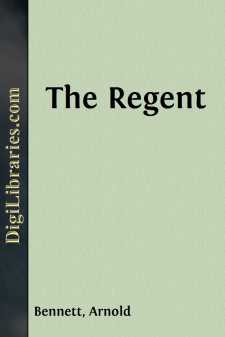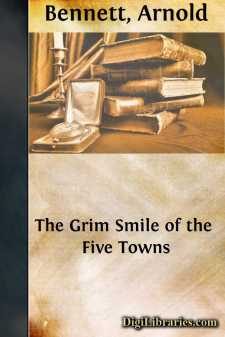Categories
- Antiques & Collectibles 13
- Architecture 36
- Art 48
- Bibles 22
- Biography & Autobiography 815
- Body, Mind & Spirit 144
- Business & Economics 28
- Children's Books 18
- Children's Fiction 14
- Computers 4
- Cooking 94
- Crafts & Hobbies 4
- Drama 346
- Education 58
- Family & Relationships 59
- Fiction 11835
- Games 19
- Gardening 17
- Health & Fitness 34
- History 1378
- House & Home 1
- Humor 147
- Juvenile Fiction 1873
- Juvenile Nonfiction 202
- Language Arts & Disciplines 89
- Law 16
- Literary Collections 686
- Literary Criticism 179
- Mathematics 13
- Medical 41
- Music 40
- Nature 180
- Non-Classifiable 1768
- Performing Arts 7
- Periodicals 1453
- Philosophy 65
- Photography 2
- Poetry 896
- Political Science 203
- Psychology 44
- Reference 154
- Religion 515
- Science 126
- Self-Help 85
- Social Science 83
- Sports & Recreation 34
- Study Aids 3
- Technology & Engineering 59
- Transportation 23
- Travel 463
- True Crime 29
Arnold Bennett
Arnold Bennett was a prolific English writer born on May 27, 1867, in Hanley, Staffordshire. He is best known for his novels set in the Potteries, a region in Staffordshire, such as "The Old Wives' Tale" and "Clayhanger," which provide a vivid depiction of life in the industrial towns of that era. Bennett's works were influential in the early 20th century, earning him a prominent place in English literature, and he was also a notable journalist and playwright.
Author's Books:
Sort by:
by:
Arnold Bennett
I - ALL MEANS AND NO END I The plain man on a plain day wakes up, slowly or quickly according to his temperament, and greets the day in a mental posture which might be thus expressed in words: "Oh, Lord! Another day! What a grind!" If you ask me whom I mean by the plain man, my reply is that I mean almost every man. I mean you. I certainly mean me. I mean the rich and the poor, the successful...
more...
by:
Arnold Bennett
ACT I Hildegarde is sitting at a desk, writing . John, in a lounging attitude, is reading a newspaper . Enter Tranto, back . TRANTO. Good evening. HILDEGARDE ( turning slightly in her seat and giving him her left hand, the right still holding a pen ). Good evening. Excuse me one moment. TRANTO. All right about my dining here to-night? (Hildegarde nods .) Larder equal to the strain? HILDEGARDE....
more...
by:
Arnold Bennett
CHAPTER I DOG-BITE I "And yet," Edward Henry Machin reflected as at six minutes to six he approached his own dwelling at the top of Bleakridge, "and yet—I don't feel so jolly after all!" The first two words of this disturbing meditation had reference to the fact that, by telephoning twice to his stockbrokers at Manchester, he had just made the sum of three hundred and forty-one...
more...
by:
Arnold Bennett
HIS BIRTH On an evening in 1866 (exactly eight hundred years after the Battle of Hastings) Mr. Henry Knight, a draper's manager, aged forty, dark, clean-shaven, short, but not stout, sat in his sitting-room on the second-floor over the shop which he managed in Oxford Street, London. He was proud of that sitting-room, which represented the achievement of an ideal, and he had a right to be proud of...
more...
by:
Arnold Bennett
CHAPTER I THE HOUSEHOLD AT HILLPORT She was walking, with her customary air of haughty and rapt leisure, across the market-place of Bursley, when she observed in front of her, at the top of Oldcastle Street, two men conversing and gesticulating vehemently, each seated alone in a dog-cart. These persons, who had met from opposite directions, were her husband, John Stanway, the earthenware manufacturer,...
more...
by:
Arnold Bennett
This preface, though placed at the beginning, as a preface must be, should be read at the end of the book. I have received a large amount of correspondence concerning this small work, and many reviews of it—some of them nearly as long as the book itself—have been printed. But scarcely any of the comment has been adverse. Some people have objected to a frivolity of tone; but as the tone is not, in...
more...
by:
Arnold Bennett
THE LION'S SHARE I In the Five Towns the following history is related by those who know it as something side-splittingly funny—as one of the best jokes that ever occurred in a district devoted to jokes. And I, too, have hitherto regarded it as such. But upon my soul, now that I come to write it down, it strikes me as being, after all, a pretty grim tragedy. However, you shall judge, and laugh or...
more...
by:
Arnold Bennett
I Mrs Brindeley looked across the lunch-table at her husband with glinting, eager eyes, which showed that there was something unusual in the brain behind them. "Bob," she said, factitiously calm. "You don't know what I've just remembered!" "Well?" said he. "It's only grandma's birthday to-day!" My friend Robert Brindley, the architect, struck the...
more...
by:
Arnold Bennett
PART I SEEING LIFE A young dog, inexperienced, sadly lacking in even primary education, ambles and frisks along the footpath of Fulham Road, near the mysterious gates of a Marist convent. He is a large puppy, on the way to be a dog of much dignity, but at present he has little to recommend him but that gawky elegance, and that bounding gratitude for the gift of life, which distinguish the normal puppy....
more...
by:
Arnold Bennett
MISS INGATE, AND THE YACHT Audrey had just closed the safe in her father’s study when she was startled by a slight noise. She turned like a defensive animal to face danger. It had indeed occurred to her that she was rather like an animal in captivity, and she found a bitter pleasure in the idea, though it was not at all original. “And Flank Hall is my Zoo!” she had said. (Not that she had ever...
more...











